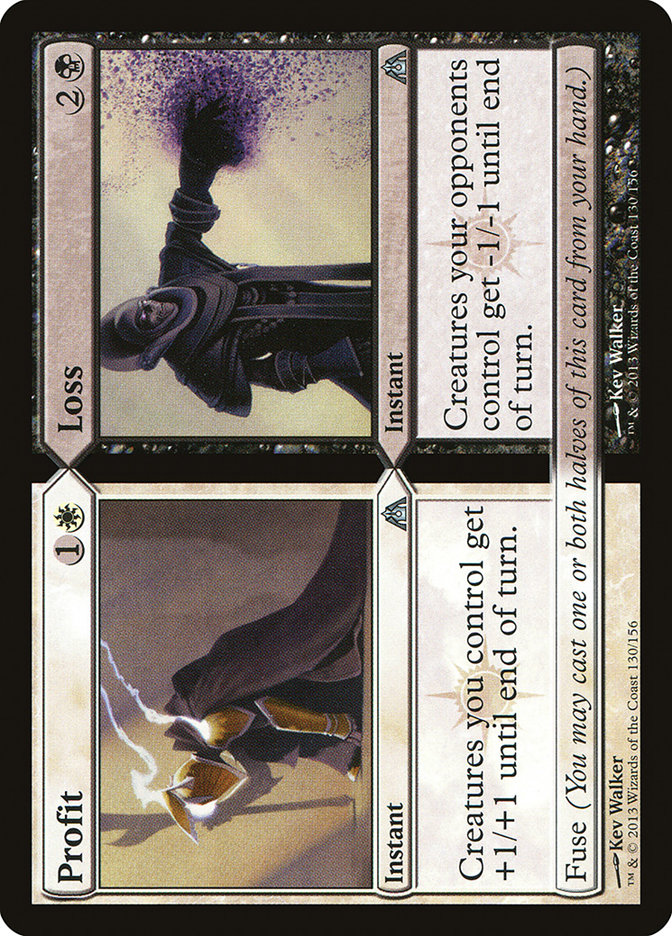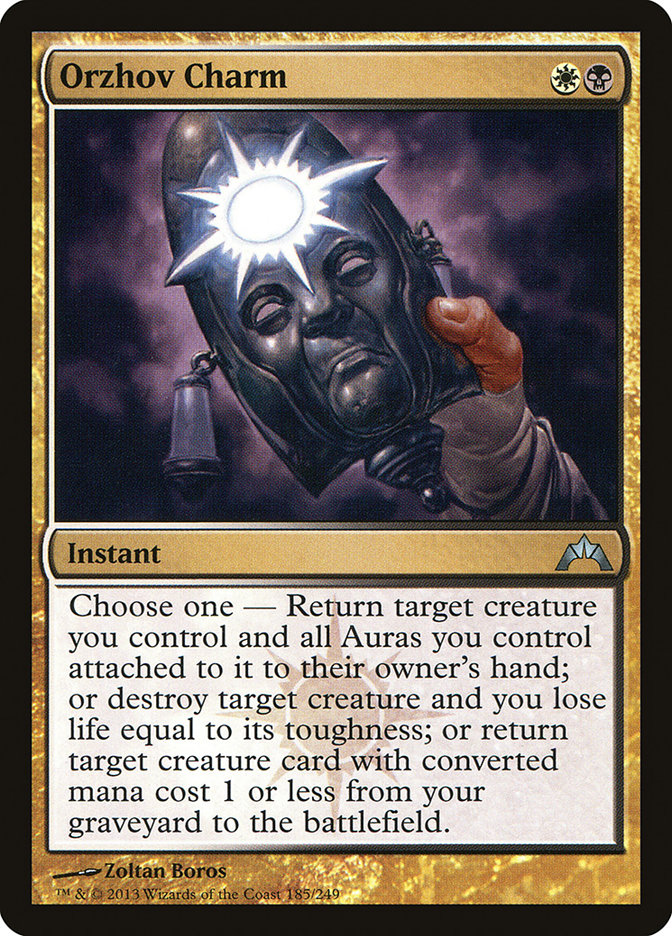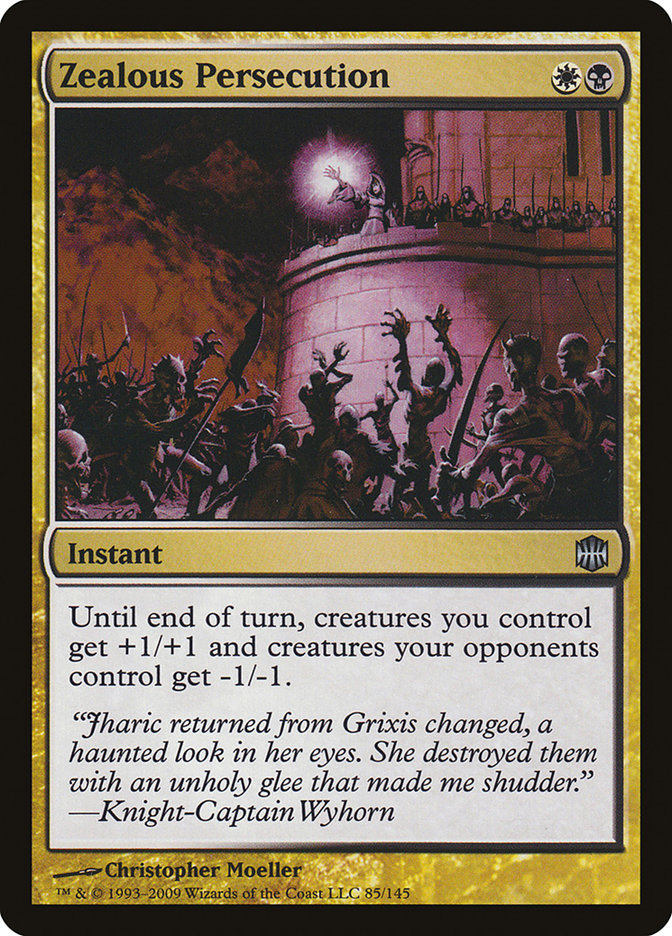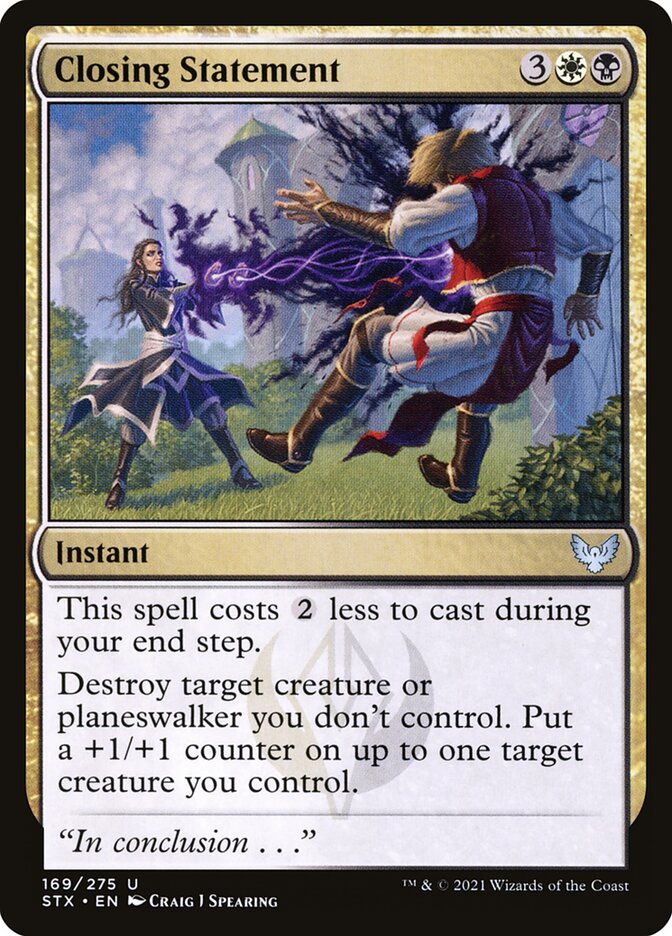Profit // Loss MTG Card
| Mana cost | |
| Converted mana cost | 5 |
| Rarity | Uncommon |
| Type | Instant |
| Abilities | Fuse |
| Released | 2013-05-03 |
| Set symbol | |
| Set name | Dragon's Maze |
| Set code | DGM |
| Number | 130 |
| Frame | 2003 |
| Layout | Split |
| Border | Black |
| Illustred by | Kev Walker |
Text of card
Creatures your opponents control get -1/-1 until end of turn. Fuse (You may cast one or both halves of this card from your hand.)
Cards like Profit // Loss
MTG enthusiasts often examine Profit // Loss in the context of its utility and synergy with other cards. This versatile card slots comfortably into the pantheon of flexible spells, somewhat akin to the renowned card Orzhov Charm. Both cards provide a dual option setup, but whereas Orzhov Charm’s effects are varied, Profit // Loss focuses purely on manipulation of creature stats.
Another comparison might be drawn with Zealous Persecution, which also offers a global effect to creatures. However, Profit // Loss grants the unique ability to split its effects between turns or even within a single turn, providing tactical leverage that Zealous Persecution lacks. On the flip side, Zealous Persecution affects all creatures for a single cost, potentially delivering a more immediate impact on the game.
The intricacy of Profit // Loss lies in its flexibility, standing as a testament to its design. It competes well within its category by allowing players to adjust their strategies reactively or proactively, a feature not commonly found among its counterparts. This adaptability ensures its place as a card valued for strategic depth in gameplay.
Cards similar to Profit // Loss by color, type and mana cost
Card Pros
Card Advantage: Profit // Loss provides a distinct benefit by allowing you to strategically influence the battlefield, giving you an edge in maintaining card advantage. When used effectively, it can tilt the tide of the game by affecting multiple creatures and potentially disrupting your opponent’s plans.
Resource Acceleration: Though not directly providing traditional resource acceleration like ramp spells, Profit // Loss can serve as indirect acceleration by preserving your board state. This could potentially save resources that would otherwise be spent on regaining board control, allowing for faster progression of your strategy.
Instant Speed: The flexibility of casting Profit // Loss at instant speed is invaluable. It enables you to react promptly to threats or opportunities that arise during your opponent’s turn. This reactive capability can lead to favorable combat exchanges or protect your critical creatures from removal, ensuring you maximize your turns.
Card Cons
Discard Requirement: One of the drawbacks of using Profit // Loss is its requirement for discarding a card. This additional cost can be quite restrictive especially when your hand size is depleting. It pressures players to make tough decisions between holding onto key cards and gaining the immediate benefits of Profit // Loss.
Specific Mana Cost: Another limitation is the specific mana combination needed to cast Profit // Loss. With a hybrid black and white mana cost for both halves of the card, it naturally fits into only certain types of decks, such as Orzhov. This can pose a challenge when you want to incorporate this card in a multi-colored deck or when your mana base is not perfectly aligned.
Comparatively High Mana Cost: The fused casting cost of Profit // Loss can be seen as high for its effects when compared to other cards in MTG. At a combined total of four mana, three of which are specific hybrid mana, players might find other cards to be more cost-efficient for controlling opponent creatures’ strength or protecting their own board.
Reasons to Include in Your Collection
Versatility: Profit // Loss offers a dual-card advantage, allowing players to choose either half or fuse both effects depending on the game situation. It can seamlessly integrate into various decks, from those seeking protection against board wipes to those requiring an unexpected combat trick.
Combo Potential: In decks that focus on creature-based strategies, Loss can be coupled with other effects to dampen the opponent’s board while Profit can turn a seemingly equal battlefield to your favor. Its synergy with cards that capitalize on creature stats or player life totals makes it a smart play in combo setups.
Meta-Relevance: With a meta that cycles through aggressive and control phases, Profit // Loss remains a relevant sideboard choice. It can tip the scales in matches where creature presence is key, ensuring your gaming strategy adapts to the prevalently employed deck types.
How to beat
Profit // Loss is a unique split card in MTG, capable of affecting the tide of battle with its ability to manipulate creature stats. To outmaneuver this card, context is key. First, awareness of the mana available to your opponent can prevent painful surprises during combat. Keeping creatures outside of its range by bolstering them is a smart play, reducing the swing that Profit // Loss can deliver.
Engaging in fights when you can back your creatures up with your own instants can mitigate its impact, giving you the edge even if Loss is deployed. Timing is crucial; if Profit // Loss is played, responding with abilities or spells that counteract its effects can turn the tables. Strategies that emphasize resilience to stat debuffs or are less reliant on creature combat also inherently minimize the card’s influence on the game.
Adapting your deck to include creatures with indestructible or similar abilities can help sidestep the detrimental effects altogether, thereby securing your board’s integrity. Ultimately, beating Profit // Loss comes down to preparedness, strategic timing, and maintaining a board that can withstand sudden shifts in power and toughness.
Where to buy
If you're looking to purchase Profit // Loss MTG card by a specific set like Dragon's Maze, there are several reliable options to consider. One of the primary sources is your local game store, where you can often find booster packs, individual cards, and preconstructed decks from current and some past sets. They often offer the added benefit of a community where you can trade with other players.
For a broader inventory, particularly of older sets, online marketplaces like TCGPlayer, Card Kingdom and Card Market offer extensive selections and allow you to search for cards from specific sets. Larger e-commerce platforms like eBay and Amazon also have listings from various sellers, which can be a good place to look for sealed product and rare finds.
Additionally, Magic’s official site often has a store locator and retailer lists for finding Wizards of the Coast licensed products. Remember to check for authenticity and the condition of the cards when purchasing, especially from individual sellers on larger marketplaces.
Below is a list of some store websites where you can buy the Profit // Loss and other MTG cards:
 BUY NOW
BUY NOW BurnMana is an official partner of TCGPlayer
- eBay
- Card Kingdom
- Card Market
- Star City Games
- CoolStuffInc
- MTG Mint Card
- Hareruya
- Troll and Toad
- ABU Games
- Card Hoarder Magic Online
- MTGO Traders Magic Online
See MTG Products
Legalities
Magic the Gathering formats where Profit // Loss has restrictions
| Format | Legality |
|---|---|
| Commander | Legal |
| Legacy | Legal |
| Modern | Legal |
| Oathbreaker | Legal |
| Vintage | Legal |
| Duel | Legal |
| Pioneer | Legal |
| Penny | Legal |
Rules and information
The reference guide for Magic: The Gathering Profit // Loss card rulings provides official rulings, any errata issued, as well as a record of all the functional modifications that have occurred.
| Date | Text |
|---|---|
| 2013-04-15 | If a player names a card, the player may name either half of a split card, but not both. A split card has the chosen name if one of its two names matches the chosen name. |
| 2013-04-15 | If you cast a split card with fuse from your hand without paying its mana cost, you can choose to use its fuse ability and cast both halves without paying their mana costs. |
| 2013-04-15 | If you’re casting a split card with fuse from any zone other than your hand, you can’t cast both halves. You’ll only be able to cast one half or the other. |
| 2013-04-15 | On the stack, a split spell that hasn’t been fused has only that half’s characteristics and converted mana cost. The other half is treated as though it didn’t exist. |
| 2013-04-15 | Some split cards with fuse have two halves that are both multicolored. That card is multicolored no matter which half is cast, or if both halves are cast. It’s also multicolored while not on the stack. |
| 2013-04-15 | Some split cards with fuse have two monocolor halves of different colors. If such a card is cast as a fused split spell, the resulting spell is multicolored. If only one half is cast, the spell is the color of that half. While not on the stack, such a card is multicolored. |
| 2013-04-15 | To cast a fused split spell, pay both of its mana costs. While the spell is on the stack, its converted mana cost is the total amount of mana in both costs. |
| 2013-04-15 | When a fused split spell resolves, follow the instructions of the left half first, then the instructions on the right half. |
| 2013-04-15 | When resolving a fused split spell with multiple targets, treat it as you would any spell with multiple targets. If all targets are illegal when the spell tries to resolve, the spell doesn’t resolve and none of its effects happen. If at least one target is still legal at that time, the spell resolves, but an illegal target can’t perform any actions or have any actions performed on it. |
| 2013-04-15 | You can choose the same object as the target of each half of a fused split spell, if appropriate. |




